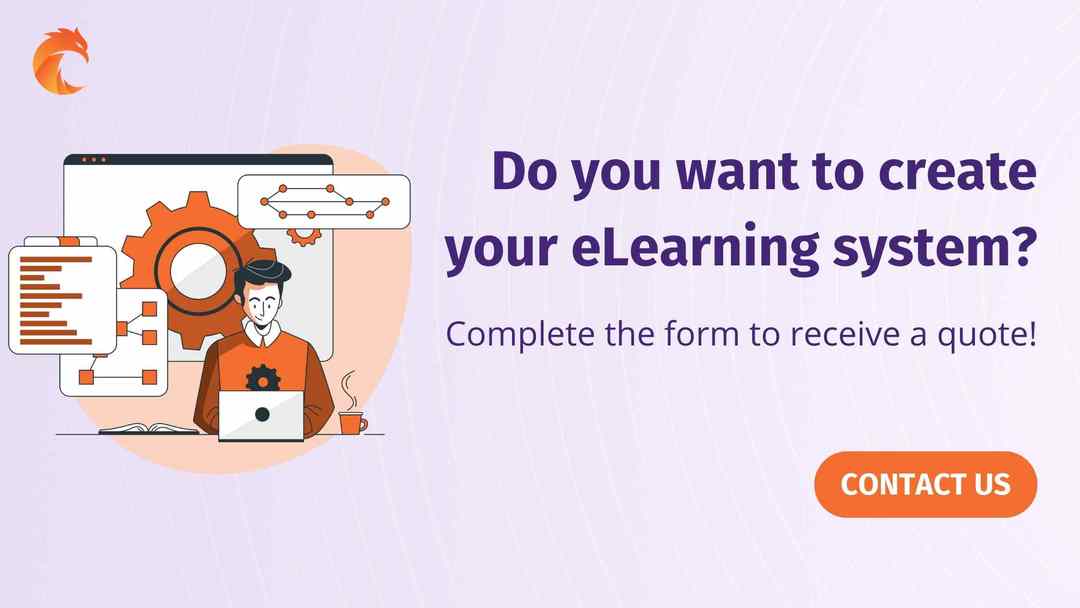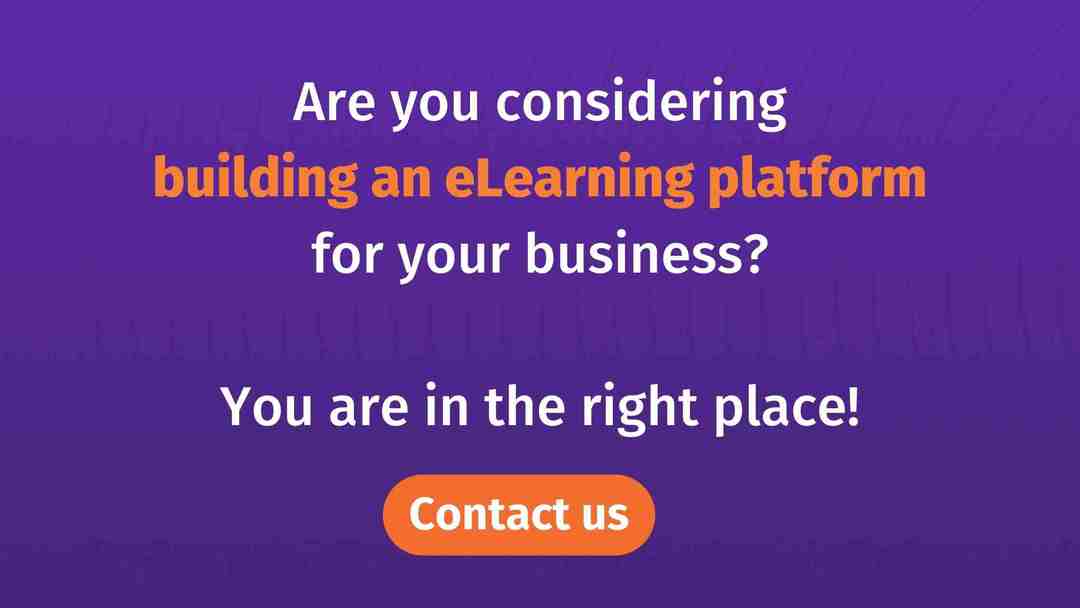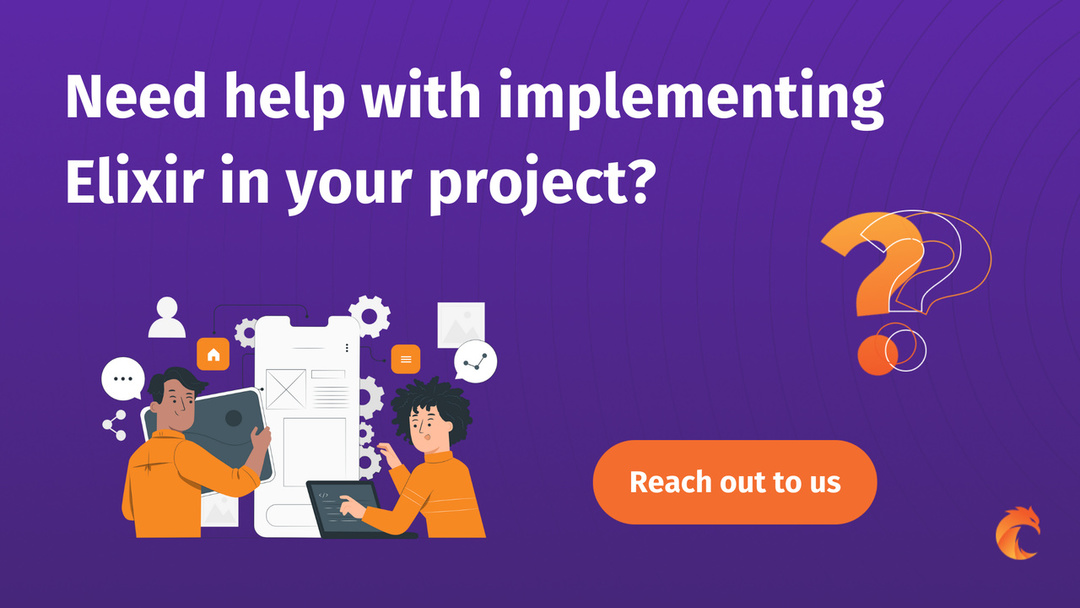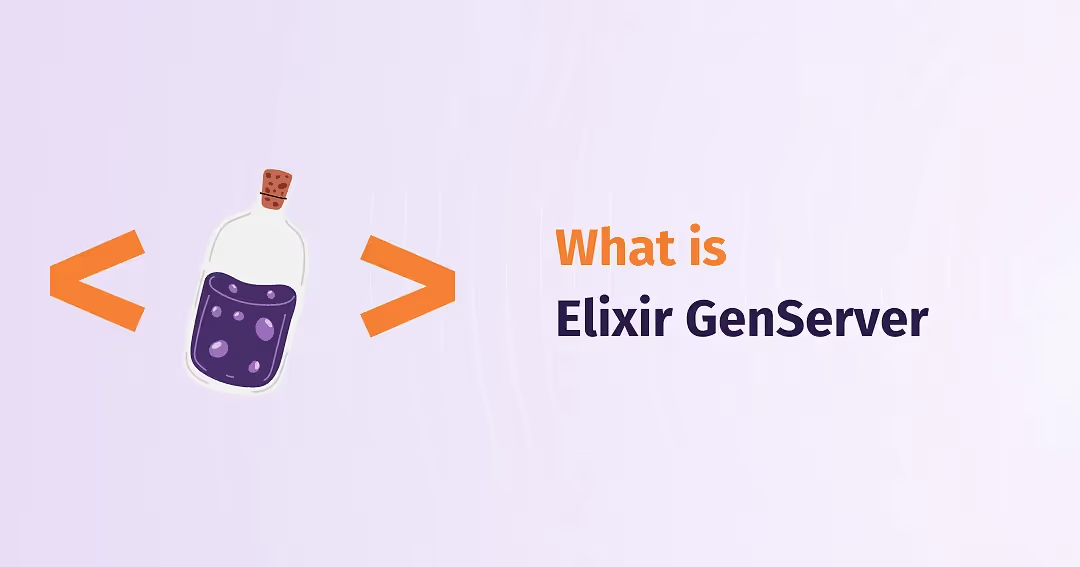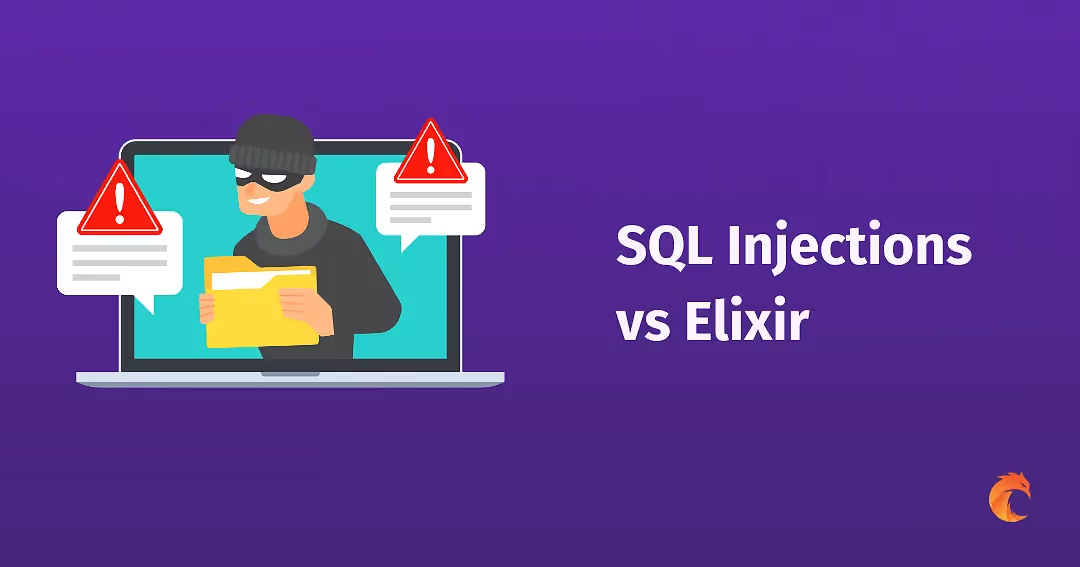Custom eLearning Application in Elixir language – why is worth it? Real-life projects examples


Many people who need an e-learning platform first look for ready-made solutions/tools available on the training application market. What if I tell you it's not always a good solution?
In theory, by choosing a ready platform for online training services, we save time and money that we would have to spend on creating a custom e-learning application. But is this always true?
In this article, I would like to convince you that creating your own Learning Management System (LMS) product can bring you significant benefits. First of all, when choosing the right technology, it may turn out that you will better meet the needs of your users, and secondly: creating your training application will not take a lot of time and money. I will show you a few advantages of the Elixir programming language that are worth analyzing if you create your e-learning application. In the end, I will give you 3 examples of eLearning apps that are made in Elixir.
Ready-made solutions or custom LMS – what training tools and software to choose
Which learning management solution better suits the needs of your future training platform? Ready-made tools or a custom e-learning application? There is no universal answer to this question as it will depend on variables such as timeframe, budget, and IT capabilities. Choosing the right SaaS (software as a Service) solution is not easy, and there are many things to consider. Usually, time and budget play the most significant role.
This puts off-the-shelf LMS software or websites as the most frequently chosen solutions. However, I have to say that a custom LMS solution combined with some personalized capabilities might be not only cost-effective and scalable but also quick to implement, constantly up-to-date, and best suited to your requirements.
When to choose a ready LMS?
A ready-made LMS could be a great option for companies with a smaller budget and less specific needs. It is also an excellent choice for those on a time crunch as an out-of-a-box solution will take less time to get it up and running with a fraction of staff resources.
Open-source software like Moodle, Joomla, or Canvas has basic student management features and many free plugins. So you don't need to worry about updates, improvements, etc.
We can say that it is battle-tested by other users. However, it might not be easy to implement a specific feature or import custom themes while paying for those you will not use. Furthermore, there is no customization (or simple options to optimize something), and adding new users may increase the costs. Plus - you must adapt to any changes, even if you liked the version before some updates.
Offering a unique solution will make your platform stand out from the competition. It would be best if you also chose the optimal technology stack that suits your needs.
Custom Learning Management Systems
When choosing the best LMS, in addition to ready solutions, we can also distinguish the so-called custom LMS. This solution makes it possible to develop and implement online training courses on your company's specific needs.
A custom LMS allows you to fully personalize the look or style of the LMS, as well as additional options, integrations, and functionalities.
The custom-made learning management system will be optimized for your needs to create the perfect online training platform. Everything can be changed and adjusted at any time.
Custom eLearning application development
If you want to provide specific functionality or deliver your courses to many students, a personalized solution will be the best for you. While it may seem more time-consuming, it is valuable - it allows you to implement whatever features you want and efficiently scale the platform (especially if you choose the right technology for development).
When creating your app, it's a good idea to have a good guide from your development company to walk you through the entire process from start to finish and provide support after launch.
With your training management system, you are responsible for fixing problems, so you have to remember also that you need to improve and manage your LMS.
What are the benefits of custom e-learning platforms?
- Your app will be fully customizable. You have control over updates, improvements and you don't need to rely on external providers. You only pay for what you need!
- Branding – you can personalize your app with brand colours and logo to increase aesthetics and gain credibility. Good branding is crucial for brand recognition.
- Custom software brings higher ROI in the long term. Why? Many businesses recognize that building their own LMS platform is a profitable endeavour because you are free to multiple courses or numbers of users. You also approach cost-effectiveness because you pay for creating and updates, but you don't pay a monthly subscription going higher whenever the app owner wants.
- If you work with an experienced team of developers, they will take care of performance issues, reliability, and security. In addition, skilled developers will choose specific elements and features to be added to your system to make it intuitive and user-friendly.
- Scalability - you can upscale or downscale your existing system whenever it is necessary. You can choose the most suitable tech stack for fulfilling your individual needs. You have complete control over-optimizing the performance and speed of your product.
- Security – Learning management systems allow for the capture and management of Big Data at once. You have your databases to safely store all the courses, training programs, and even student data. All learning materials will be easily maintained and changed. Hosting's, APIs, SSLs – your eLearning app comes with the security that matters for you because you centralize learning resources. You can also consider security features that reduce the chances of information getting lost in the wrong hands.
- Efficiency testing - you can better measure the effectiveness of learning because you are a data owner, so you can use them to analyze in a way that you deem valuable.
How to build an e-learning platform for your business? Necessary features for the eLearning app.
You don't need to be a Udemy or Coursera level to follow their example. But of course, with their success, they must do things right, so it is good to take an example from those Giants. First, if you think about setting up your own Learning Management System, make sure to constantly analyze the market, come up with new features for your custom e-learning solution, and ensure ongoing custom e-learning development and support.
It doesn't matter you want to create internal training software or an external training tool - choose the right development approach and implement must-have features. Several features comprise almost any eLearning platform, divided into the student, teacher, and admin panel features. Let's try to collect them below.
Features for Custom eLearning Platform Development
Student profile features
User experience is one of the most important things that affect the success of your eLearning application. Users are just used to certain features. The lack of fundamental solutions for the user/student may cause them not to want to use the application.
- registration, basic user profile info, and profile settings
- separate dashboards for learners - a student's dashboard is an absolute must for eLearning apps. In there, users can choose courses and access their learning materials library (pdf, pictures, notes), video courses, and lectures, check the history of purchases and courses done
- search, category, and filter - enables to search for specific keywords and courses, divided into several categories based on subject, prices, expertise level, etc.
- calendar
- push notifications and messages
- recommendations - show relevant courses based on ones the student already enrolled for
- reports/progress tracking, feedback forms
- assignments and tasks/quizzes and tests
- easy payment options - student profiles should be integrated with a payment gateway for easy and secure transactions
- social aspects: groups, likes, chats, messages
- help section
Functionality for Teachers/Coaches/Course Managers profile
Don't forget to think about all possible features for teachers and course managers. They create the entire content of the courses, so whether it will be intuitive and straightforward for them is of great importance. On the teachers' side, it is undoubtedly essential to interact with course participants, show presentations, use whiteboards, draw/write, and catalogue the courses into appropriate categories, along with course materials. So let's try to collect the most critical features for course managers:
- registration and profile settings
- push notifications and messages
- calendar
- course content creation and updates - they should be able to create and edit the content of courses
- dashboard – If your e-learning solution makes use of live classes delivered via videoconferencing or engages instructors in any other way, you need to provide them with a dashboard as well, to keep track of the courses they have uploaded, number of participants, people who made tasks, etc.
- library of content, course materials with categories, file repository, and the possibility to share them/send them to students
- messages, chats, communication tools
- video module, screen sharing, whiteboard module, marking tools
- reports/students' progress tracking, feedback forms
- giving assignments
- assessment tools
Admin profile features in eLearning apps
- users' management (add/edit, remove)
- add/edit and remove courses
- statistic reports
- manage notifications
- subscription plan change (if we talk about external apps)
- personalization module (logo, themes, templates import)
- push notifications
- alerts, Q&A
- integrations with external systems
The above features are the most important considerations for custom eLearning applications. But there are also some other LMS challenges that you should consider implementing as features of your application. Check: eLearning Challenges 2022-2026
How to build an e-learning platform for your business – From idea to MVP and the full app
For any software development project to be successful, you need to have a clear idea about its target audience — the needs, preferences, pain points, and goals of the people using the solution. Consider things like:
- Are your users tech-savvy, or might they need more straightforward navigation?
- Will you be training people with different levels of experience and knowledge, or dedicate your tool just to beginners?
- In which areas could training bring the best ROI?
- Do your students prefer using mobile devices for learning purposes?
- What are the learning formats your target audience prefers?
- If it is an external eLearning application – what monetization strategy will you choose for external users? (subscription, advertising)
- Identify the key features of your platform.
Starting with good audience research and building MVP is necessary to test your idea with your potential users. Building an MVP with only the must-have features is an amazing way to check the usefulness of your solution on real-life users. You can read more about MVP development in our post.
Choosing a Tech Stack for Custom eLearning Platform
Apart from the main integrations you should consider (like mailing services, push notifications, payments, social media), you have to think about the best technology stack your future eLearning app will be created in. All content management and task management, video calls, file library, user management need the right technology to make your application work fast and smooth.
Most of eLearning are real-time meetings, so clean, stable and customizable code can give you much better opportunities to grow your application in the future.
Why Elixir is perfect for e-learning
First of all, Elixir was built as a concurrent and productive programming language. It has already been successfully used in many industries, like banking, advertising, telecoms, e-commerce, etc. Thanks to several successful implementations, it's been gaining popularity as a reliable language perfect for microservices, cloud computing, and instant messaging or video chats. Elixir programming language is not dedicated to any specific niche and can be utilized for several projects. Thanks to its wide applicability, it can be successfully used to build functional solutions for any industry.
Thanks to Elixir language productivity, you can reduce the amount of code, and as a result, build your application fast. Speed, response time, and performance are simply impressive, which is why programmers are more and more interested in this programming language.
According to Stack Overflow Developer Survey, Elixir will be the 4th most loved language in 2021. Why? Probably two main reasons are that the coding process is fast, smooth, and joyful, and also the Elixir community is really supportive and still growing.
Elixir is one of the most powerful modern languages for developing scalable, distributed systems. So, Elixir will be perfect for all products based on growing a community, chatting, video chatting, and exchanging real-time messages and requests even by millions of users simultaneously, making it the perfect choice for eLearning apps.
Knowing what the main features are in your eLearning app, let's take a closer look at Elixir technology and see why it can answer your needs.
Scalability of eLearning app vs Elixir
LMS platforms should be flexible, scalable, and engaging for your users. Ideally, your eLearning app should have the ability to take on more users, more content, and more requests without affecting loading times or facing debilitating bugs. If it is like that – it can grow to meet your evolving user and business needs.
Elixir has a remarkable ability to scale! Higher traffic is not a big problem for Elixir, so we don't have to change the technology stack when the application starts driving more traffic.
Videocalls and many interactions in eLearning apps vs Elixir
Elixir is based on Erlang, which is perfect for applications with a lot of simultaneous connections at the same time. It was created to handle many calls simultaneously and resume calls as soon as something disconnects incredibly quickly.
When you think about real-time meetings with many users connected in your eLearning app, maybe even run a couple of these meetings simultaneously – that means your app must be able to handle many data and many requests at one time. And Elixir is an excellent solution for scalable eLearning applications, where you need to provide an intuitive experience with high-performance and low-load times.
Quick reaction for bugs vs Reliability of Elixir
Once you know there will be lots of data transferring and that your app can grow in real-time, you need to be ready that it can create some issues during the development process in any technology you use. But what makes Elixir different is that Elixir has a great approach to fault-tolerance. While things sometimes inevitably fail in production, lightweight processes can be quickly restarted by the supervisor system. This deals with most bugs that are not due to serious faults in software development.
3 examples of eLearning apps that are made in Elixir
TICH – real-time, virtual-classroom for Bunsan company
TICH is a virtual classroom tool that was made by Bunsan company for their employees. As a software company, they work remotely but still need to educate their workers. Unfortunately, existing learning platforms didn't cover their specific needs, so they have built TICH, which allows them to use features like a real-time whiteboard, screen sharing, slides show, video and audio calls, and recording sessions. The leading technology used in that project was Elixir & Phoenix.
That allowed Bunsan to bring their employees the best experience for students and instructors into a virtual classroom. Thanks to that, they had effective communication and incentive participation of students by using features like raising hands and controlling transference. A student also can select which content they want to see during the classes. From that time, they forgot about using several tools to teach effectively. Tich had it all integrated into one tool. See a case study of creating TICH.
It is changing from a beta version tool only for their needs now, and they are open to sharing TICH with others. In addition, Tich is a web-based tool, which is another advantage – they don't need to install additional software on anyone's device. That unlocked the most accessible experience for everyone in the course.
Trybe – web development online school
Trybe offers complete, and high-quality training in Web Development focused on technical skills, soft skills, and preparation for the job market. By the end of 2022, there will be more than 3,500 "Trybers" starting in the market, with proficiency in all course modules.
Trybe understands that simplicity and reliability are essential aspects of building any system – that's probably why they also chose Elixir. But, like they are saying about themselves – they dream of transforming the world through education.
Their main goal is to keep up with the latest development technologies, apply them to help the team's speed and quality, and ensure that their products run as smoothly as possible.
Digiforma - training management and E-learning platform
Digiforma is a comprehensive platform for vocational training. It is an educational application with a large customer base used by over 2500 organizations in France alone. It includes both a training management system and a complete e-learning platform.
This learning app example is exceptional for us because Curiosum was involved in the development process of Digiforma. You can check this training management platform case study here.
In the Digiforma project, we've been tasked with developing software through Elixir, Phoenix, and React for a full technical stack. As a result, we were involved in many parts of this software - some new components and some rewriting.
Digiforma is a well-established, large-scale training and management platform with a growing e-learning component. Development work has focused on developing e-learning product capabilities, including a webinar conferencing tool and a suite of elegant content creation features.
Summary – why Elixir in the eLearning app?
Elixir is great for all products intended to handle big traffic, scale, process big amounts of data, and provide easy development and maintenance.
That is exactly what every training management and eLearning platform needs.
An experienced Elixir development team is a key to the success of fast-growing enterprise training and education tool. With the right technology and a good development approach, your application will answer your audience's needs.
Create custom courseware designed to engage your target audience and fulfil your business objectives in a timely, cost-effective manner. And remember – we are ready to help!
Want to power your product with Elixir? We’ve got you covered.
Related posts
Dive deeper into this topic with these related posts
You might also like
Discover more content from this category
Elixir GenServer is a behaviour module for implementing concurrent and stateful processes.
Discover this unique project's challenges, solutions, and exciting features that aim to revolutionize property management.
SQL Injections. It's a monster that every programmer has heard of, but only a few have seen its devastating effects. Also, it's very likely that you've created at least one such vulnerability on your programming road and don't even know about it.


